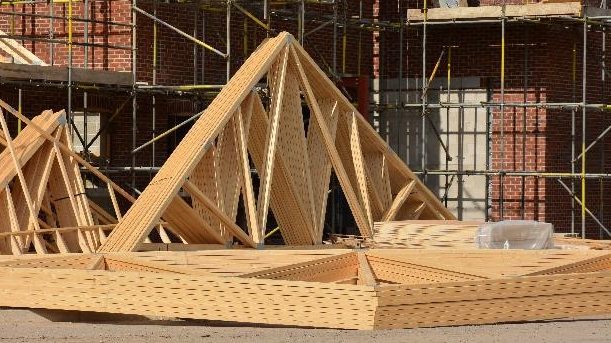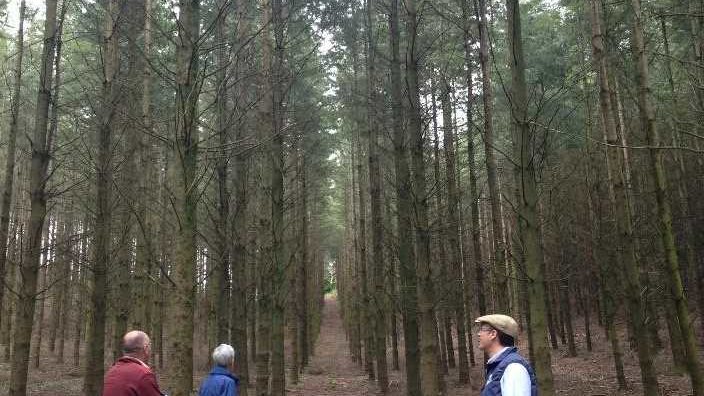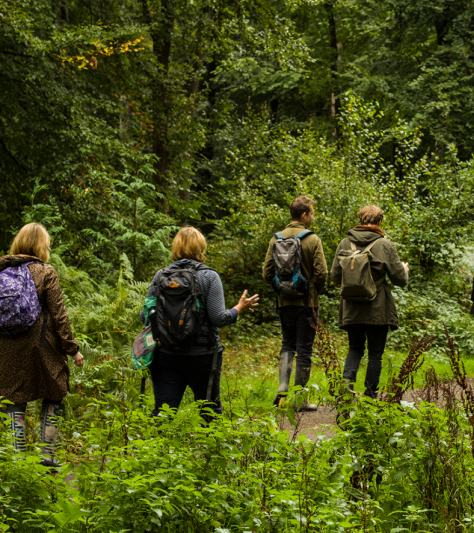Growing Houses: Douglas Fir in Somerset
In 1988 Theed Forestry Estates converted two fields of unproductive pasture to Douglas Fir with the primary objective of growing timber for local houses. Thirty years later, the plantings so impressed judges in the RFS Excellence in Forestry Silviculture Awards 2018, the estate was awarded a Certificate of Merit.

Theed Forestry Estates, Combe Sydenham, Taunton, Somerset.
Forestry that pays
Theed Forestry Estates chose Douglas Fir over more traditional oak for the 6.8ha site both because of its resistance to diseases and its proven qualities (strength, length and durability) to the housing construction trade and particularly for roofing.
The estate had also been inspired by the use of Douglas Fir in the 1980s restoration of York Minster roof and by research in British Columbia.
For William Theed, Douglas Fir combines his passions for “forestry that pays” with his support, as founder of Falcon Rural Homes, for affordable
housing for local people.
He believes Douglas Fir grown in the South West of England can be profitable, can supply local market needs and rival the quality of any grown in Scotland and the north of England.
Early thinnings have already generated more than 700 tonnes for woodchip for the estate’s biomass boilers and for woodfuel sold by Exmoor Woodfuel Ltd under the Grown in Britain licence. Regular thinnings will provide on-going cash flows until the final crop, in 30-40 years’ time which will be sold direct from the site to market.
Plantings
Soils are a deep mineral soil overlying sandstone, perfect for growing Douglas Fir! Planting was partfunded by a Forestry Grant Scheme designed to encourage conifer planting. Douglas Fir of Darington provenance was transplanted bareroot at 2m spacings.
Management
Brashing was carried out in year 10 and first thinning at year 19 (one row in nine). The crop was selectively thinned at years 24 and 29 (2017). Informal high pruning has also taken place. Persistent beating up reduced initial rabbit and deer browsing and ensured successful establishment.
The estate believes selective thinning every three years:
• enables it to spot any early signs of disease and increases resilience to disease (In 2010, Combe Sydenham was the first site in the UK to confirm
phytophthora ramorum in larch);
• establishes with local communities that trees need to be worked so they grow faster and better;
• helps build access to enable timber lorries into the heart of the wood for the final felling operations.
Markets
Yield class varies from 20 to 30, and recent acoustic grading has shown the trees are likely to produce high volumes of strong (strength class C24) timber.
Theed Forestry Estates has established contacts with local mills and markets. A recent crop of mature Sitka spruce elsewhere on the estate generated more than enough funds for a six figure re-roofing contract on the estate building, boosting confidence that mature Douglas Fir will command a similar premium price in the future.
The estate is planning additional plantings of Douglas Fir.
Theed Forestry Estates, Combe Sydenham Country Park, Monksilver, Taunton, TA4 4JG



